|
If your hearing isn’t as good as it used to be, a loved one’s voice, music, or nature might not sound like it used to. You can enjoy these sounds again with a great pair of hearing aids.
If you’ve put off receiving hearing aids for too long, wearing hearing aids and hearing sounds that you haven’t heard in years can be overstimulating to the ears and brain. Don’t let this discourage you from wearing them every day. Adapting to hearing aids takes time and patience. What Should You Notice within the First Few Weeks? Based on your range of hearing loss, noises around you can sound stifled, or you can’t identify every noise and where it’s coming from. Hearing aids can be programmed so you can focus on sounds in front of you, sounds coming from behind you, or sounds coming from all directions. As you familiarize yourself with the hearing aids, everyday noises may sound louder than usual. The sound of your own voice and other ordinary noises could sound unusual. When it comes to hearing aids, there are certain things that you’ll need to familiarize yourself with.
Handle Hearing Aids with Care For a smooth adjustment to your hearing aids, get acquainted with the devices. Get the basics from your hearing aid provider. Learn to properly insert and remove your hearing aids, and practice daily. There are special maintenance and cleaning practices for your hearing devices, so ensure that your provider goes over those with you. Test the hearing aid’s settings and focus on the differences in various environments. Hearing Aid Usage at Home Begin to wear your hearing aids in a quiet indoor area at home. It makes it easier to distinguish and recognize sounds without uncontrollable background noises. After doing this, try going outside for a walk. Wearing hearing aids outdoors is a different experience. You’ll have the opportunity to concentrate on many different and quiet sounds, minus the distracting background noises. Having a Conversation Your initial conversation while donning hearing aids should take place in a casual setting. At the most, you should only be speaking to two people in a distraction-free space. You can explain how your hearing loss has shifted your communication style and what they can do to ease conversations with them. The Best 3 Ways to Have a Conversation if There’s Background Noise
How to Deal with Loud Surroundings After getting acquainted with your hearing aids, wear them in an area with a lot of background noise. You can check your ability to isolate background noises and handle conversations in these environments. The New Experience of Better Hearing When you can hear better with your new hearing aids, as mentioned before, the initial experience will most likely be unpleasant. Hearing the sound of your own voice can be alarming due to the occlusion effect. It’s when a person hears their own voice as sounding “booming” or “hollow” with echo-like noises. According to some hearing aid users, it’s like talking while being in a large barrel. This occlusion effect occurs when bone-conducted sound vibrations reverberate throughout the ear canal. It can intensify low frequencies. Some have also described it as “your own voice resonating in your head.” The solution is to ask your hearing instrument specialist to change the amplification and ventilation ratios. If you are experiencing hearing loss and need an evaluation and hearing aids, contact Northumberland Hearing Center for a consultation.
0 Comments
Your comment will be posted after it is approved.
Leave a Reply. |
Archives
July 2024
Categories
All
|


 RSS Feed
RSS Feed
